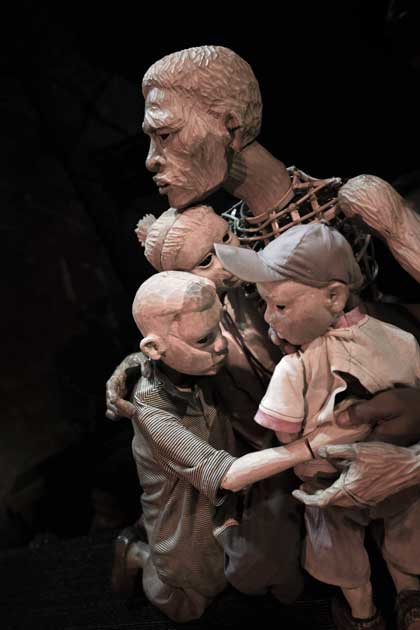Play (2022)
A Baxter Theatre Centre and Düsseldorfer Schauspielhaus Production
Adapted and directed by Lara Foot in collaboration with Handspring Puppet Company
based on J.M. Coetzee’s novel Life and Times of Michael K (1983)
ArtsEmerson
Emerson Paramount Center, Robert J. Orchard Stage
Theater District, Boston
January 31 – February 9, 2025
Adaptor, Puppet Director: Basil J.R. Jones; Adaptor, Puppetry Director, Design and Creation: Adrian P. Kohler; Composer: Kyle Sheperd; Set Designer: Patrick Curtis; Costume Designer: Phyllis Midlane; Lighting Designer: Joshua Cutts; Sound Designer: Simon Kohler; SOUND SYSTEM DESIGNER: David Claassen; Projection Designer and Editor: Yoav Dagan; Projection Designer: Kirsti Cumming
With Actors: Andrew Buckland, Sandra Prinsloo, Faniswa Yisa, Carlo Daniels, Billy Langa, Nolufefe Ntshuntshe; Puppet Master: Craig Leo; Puppeteers: Roshina Ratnam, Markus Schabbing

from “The Life and Times of Michael K”
Photo: Fiona McPherson
Courtesy of ArtsEmerson
Based on an award winning 1983 novel by South African writer J.M. Coetzee, this is the story of Michael K., born with a cleft lip, and his mother, and their odyssey to the place of her birth and upbringing. During a time of civil war in South Africa (fictionalized in Coetzee’s novel), they meet with all sorts of challenges along the way, natural and human. Michael’s mother dies en route, but Michael persists in the hope of bringing her remains to the original and much sought-after destination.
This quite straightforward tale is heartrending in its depiction, mostly because of the absolutely graceful and intoxicating puppetry through which the story is told. Life actors from Handspring Puppet Company control the puppets as they travel around on stage with them and speak their roles by standing next to them. The effect is magical, and one remains transfixed by the gentle and expressive movements of each of these puppets and the evocation of the characters that these movements effect.
More like a dance performance than a typical play, this work offers a wonderfully dreamlike and mellifluous quality which persists throughout. As story theater, this show has a narrative homogeneity that evokes the sense of a raconteur offering an account at arm’s length; the persuasive part of it in the lilt and in the poetry of that account. Both the speech of the actors and the movements of the puppets are penetratingly graceful and quietly enthralling. One knows from the narrative that the venturing pair, and then Michael alone, are threatened in time of civil war (fictional, though set during the time of apartheid), but the prevailing sense is one of continuation and pursuit through episodic challenge. Intermittent fight scenes – beautifully choreographed – evoke those periodic challenges. But the graceful sway of the gestures and the compelling music of the narration keep one’s sense of the rhythmic momentum of Michael’s ongoing determination.
The production values of sound, lighting, video, choreography contribute significantly to the suggestive context in which the action appears. Original compositions by Kyle Sheperd assisted by sound design by Simon Kohler rise up consistently and subtly from, as it were, the bottom of the production, non-invasively, oozing into one’s bones highly effectively rather than hitting one face-forward. Lighting by Joshua Cutts and videos by Yoav Dagan and Kirsti Cumming support accessory views of the puppets, adding environmental texture to the variety of scenes. And the choreography, though not omnipresent, is highly effective when it makes itself felt.
One might criticize a tonal monotony in this dramatization’s narrative if one were looking for more climactic content. Much of the time, not too much seems to happen in this play which appears to abstract to a fair extent from Coetzee’s novel. The novel, though indeed metaphoric in many aspects, has a more complex and diversified story line involving Michael’s trials upon reaching his mother’s home town of Prince Albert, but the complexity of that portion does not translate significantly to this staged production. His time on a farm, at a rehabilitation camp, and among a group of nomadic people who introduce him to a woman with whom he has a sexual encounter are part of these highly abbreviated or eliminated treatments. Some nuance in the characters is lost as well, especially that Michael’s mother rejects him early on because of his cleft lip, which makes his utter devotion to her and his honoring of her desire to return to her ancestral home as she approaches death that much more compelling and heartrending.
Nonetheless, if one gets into the lilt of the performance and appreciates this as a kind of dance, then the uniformity of the narrative does not really matter too much. In a sense, this approach is in keeping with the depiction of a so-called “simple” man, which though non-dramatic, expresses his extraordinary qualities of a peaceful disposition, an undying filial devotion, and a consistent pursuit of his quest, in the magnificent poetry and gracefully evocative gestures of the puppets and the lilt of the voices and narrations attending them.
– BADMan (aka Charles Munitz)
Leave a Reply